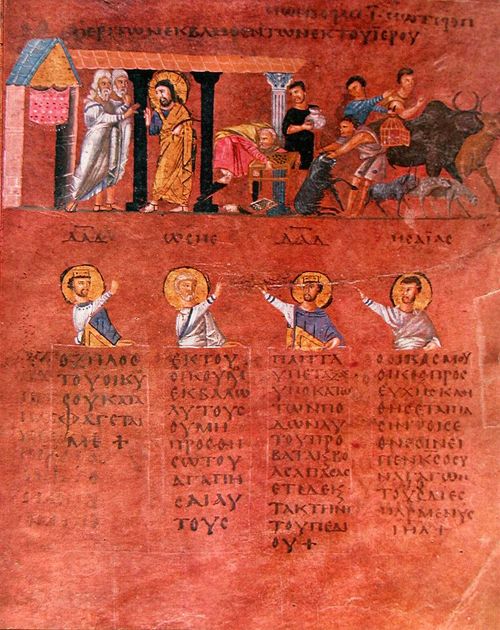2 Kings 23:1-3
Then the king sent, and all the elders of Judah and Jerusalem were gathered to him. And the king went up to the house of the LORD, and with him all the men of Judah and all the inhabitants of Jerusalem and the priests and the prophets, all the people, both small and great. And he read in their hearing all the words of the Book of the Covenant that had been found in the house of the LORD. And the king stood by the pillar and made a covenant before the LORD, to walk after the LORD and to keep his commandments and his testimonies and his statutes with all his heart and all his soul, to perform the words of this covenant that were written in this book. And all the people joined in the covenant.
Mark 11:15-17
And they came to Jerusalem. And he entered the temple and began to drive out those who sold and those who bought in the temple, and he overturned the tables of the moneychangers and the seats of those who sold pigeons. And he would not allow anyone to carry anything through the temple. And he was teaching them and saying to them, “Is it not written, 'My house shall be called a house of prayer for all the nations'? But you have made it a den of robbers.”
———————
Out of the twenty sons of David to follow him to the throne in Judah, there are but two who are remembered for their extraordinary faithfulness: Hezekiah and Josiah. Of those two, Josiah stands out as son of David who will best paint a picture of The Son of David, the Messiah— Jesus of Nazareth.
You will remember good King Hezekiah, after he had revealed the treasures of the Temple to the Babylonian envoys (2 Kings 20), the prophet Isaiah pronounced an oracle of doom for Jerusalem and the Temple, to which Hezekiah replied (20:19), “The word of the LORD that you have spoken is good.” For he thought, “Why not, if there will be peace and security in my days?” Fast forward to Hezekiah’s great-grandson, Josiah— same prophetic tenor, same judgment, this time from the prophetess Hulda. The king’s response this time? Certainly not the Hezekian contentment of a peaceful demise. Josiah unleashes the most extensive campaign of reform and cleansing in Jerusalem, and throughout the entire Land, north and south.
Following the recovery of the Book of the Law, most likely a copy of Deuteronomy (perhaps the original in the hand of Moses), Josiah duplicates a Covenant renewal with the People (23:1-3), not seen since the days of Joshua and the entry into the Promised Land. The campaign covers 2 Kings 23:4-24, ending with a glorious Passover celebration of all Israel. The penultimate footnote to Josiah declares (23:25), “Before him there was no king like him, who turned to the LORD with all his heart and with all his soul and with all his might, according to all the Law of Moses, nor did any like him arise after him.”
Nevertheless, the ultimate word comes in 23:26 “Still the LORD did not turn from the burning of his great wrath, by which his anger was kindled against Judah, because of all the provocations with which Manasseh had provoked him.” “Still”! Not enough. Too little, too late. Past the point of no return. Josiah’s efforts were Herculean, and yet, not long afterwards, he will be ingloriously killed in battle by Pharaoh Neco at Megiddo (23:29-30).
It will fall to another Son of David to complete the job of purifying Israel. Jesus will replicate the reforming actions of Josiah when he comes into the Temple courts and overturns the tables of the moneychangers. The commercial activities of the Temple were symbolic of a rot that made its way all the way to the bone. In Christ, these “reforms” would not fade away like Josiah's efforts. The Temple itself was merely a pointer to what God was going to accomplish in Jesus. As Baal and Asherah worship was swept clean, so Jesus with the Jerusalem Temple-- Jesus IS the new Temple that cannot and will not be corrupted. And, this majestic, new Temple has been localized in each believing heart, through the Holy Spirit.
Looking back on the reign of King Josiah, as insufficient as it was to turn the tide in the long term, we see a vigilance and faithfulness that needs to find a home in our own hearts. Through the Holy Spirit, that is possible!
Inset Art: “The Cleansing of the Temple” from the Rossano Gospels, 6th century. The verses cited below are Psalm 69:9, Hosea 9:15, Psalm 8:6–7, and Isaiah 56:7–8. Discovered in 1846 in Rossano Cathedral (southern Italy), the Rossano Gospels is the oldest extant illuminated manuscript of the New Testament Gospels. It is one of the oldest surviving illuminated manuscripts of the New Testament.


